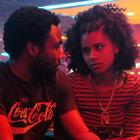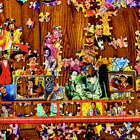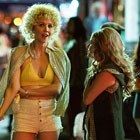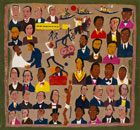
Improbable Outcomes
Some Trick: Thirteen Stories by Helen DeWitt New Directions, 2018, 224 pp. Some Trick is Helen DeWitt’s third book. That is to say, her third published book. She has written dozens of others that haven’t made it from her …


Some Trick: Thirteen Stories by Helen DeWitt New Directions, 2018, 224 pp. Some Trick is Helen DeWitt’s third book. That is to say, her third published book. She has written dozens of others that haven’t made it from her …

For all his differences with his predecessor, New York City mayor Bill de Blasio has inherited the same fundamental dilemmas that faced Michael Bloomberg—and much of the billionaire’s approach to resolving them.

Doomsday prepping has long been associated with the right. Why is it catching on among liberals?

The genius of Donald Glover’s Atlanta is to show the surreality of black life in America.

As the old neighborhood gentrifies, its transatlantic spirit lives on as the influence of black culture grows—from Lagos to London, from Havana to Atlanta.

Channeling the anti-Trump #Resistance, a slew of recent books seeks to reduce democracy to a defense of political “norms.” But overcoming today’s crisis will take more political imagination.

In her short stories, Ottessa Moshfegh chronicles downward mobility on the part of the privileged—and in so doing exposes their unfitness to rule, if not to exist.

One of the “hottest radicals” of the early twentieth century, Max Eastman is now largely left out of the pantheon of the left. Can we still learn from this idiosyncratic editor today?

Leftists have reason to be optimistic, not because demographics will save us, but because a growing number of progressives are rediscovering the value of good old-fashioned organizing.

One of France’s most influential contemporary thinkers, Marcel Gauchet manages to craft a compelling historical account of half a millennium, exploring how we arrived at today’s crisis—and how we might get out.

Set on and around the New York City waterfront, Jennifer Egan’s new novel Manhattan Beach offers a feminism suited to the “lean in” age.

The Deuce, at its best, offers a 360-degree view of New York’s sex economy—but as the show progresses, Times Square’s street characters become a sideshow.

Abolitionism is often depicted as an ineffectual campaign led by white liberals, but it was actually a radical, interracial movement—galvanized above all by the resistance of slaves themselves.

A crucial new work of generational analysis explores how society turned millennials into human capital.

While constantly pushing their workers to do more with less, companies have found new ways of easing the pressure. Enter the mindfulness craze.